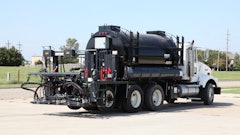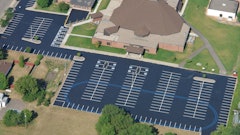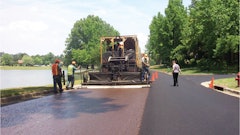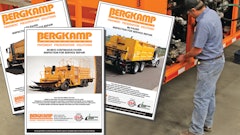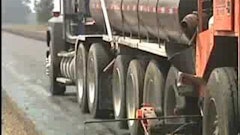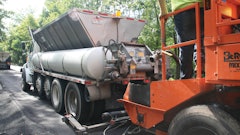
Microsurfacing is a pavement maintenance option that is a mix of aggregate, quick-set asphalt emulsion formulation, water, liquid additive, and mineral fillers. Microsurfacing can be placed in multiple lifts and be applied thicker than its parent product, slurry seal, so it offers a number of options in addition to the sealing and resurfacing features slurry seal does.
Microsurfacing is found on all types of surfaces, including interstate highways, city and residential streets, and parking lots. The microsurfacing market varies from region to region in the United States. In California, budget crunches have reduced the amount of dollars going into pavement maintenance, but municipalities still divert funds toward certain microsurfacing jobs. "In California, we will go with microsurfacing as a primary decision when we are doing work that needs to be opened up quickly to traffic or is critical structurally, in other words, you're filling ruts," says Jeff Reed, president of Valley Slurry Seal, a microsurfacing equipment and materials manufacturer in West Sacramento, CA. "The other place we would go to a microsurfacing is at night."
Equipment used in microsurfacing applications is very versatile and often doubles as slurry seal equipment. Many of the changes in microsurfacing equipment that have taken place in recent years have been evolutionary, such as increased speed, advancements in pugmill design, and improvements in reduction of noise level, which is a benefit for the operator.
Truck-mounted machines
Truck mounted microsurfacing machines are loaded at a materials site, driven to the job site, and the material is laid until the machine is empty. If more material is needed, the truck returns to the materials site for another load. On bigger jobs, truck mounted machines can work in tandem.
California Pavement Maintenance, Inc., a Sacramento, CA, company that's in the paving and pavement maintenance business, manufactures the RoadSaverII and RoadSaverII-E. The RSII-E is a machine identical to the RSII, but with a less-expensive hydraulic system. Both are capable of placing slurry seal or microsurfacing. The RSII's production rate is 4 tons plus per minute, but can be increased or decreased by the operator. Charles Soares, RoadSaver sales manager, says California Pavement Maintenance manufactures a variety of spreader boxes for the RSII, including a microsurfacing box and a rut box. The RSII features calibrated direct-drive material feeds and electronic material monitoring systems tied to infinitely adjustable flow controls. The company has also made improvements on its machines in recent years.
"We have made several field-proven advances to the RSII, such as a special pump and metering system to post-add synthetic polymer's or natural latex into the slurry seal or microsurfacing system and a similar system to post-add carbon black inks compatible with anionic and cationic asphalt emulsion systems," Soares says.
Valley Slurry Seal's Reed says his company got into building microsurfacing equipment because he wasn't happy with the equipment available at the time his company broke into the microsurfacing market. Today Valley Slurry Seal offers several truck-mounted machines. The newest in the company's fleet, and its largest, is the 12C, which is capable of placing up to 5 tons per minute. "The 12C is a substantially faster machine than others in the marketplace," says Reed. "It's primarily built as a high-production machine for our utilizations out here on the West Coast."
Salina, KA, manufacturer Bergkamp Inc., offers the HD10 and M2 series of truck-mounted microsurfacing machines. These machines can be used with Bergkamp's hydraulic spreader and rut boxes, and another box that can be adjusted while paving.
"Something Bergkamp manufactures that's unique to this country is the variable width spreader box, which allows the driver to change the spreading width between 9 and 14 ft. without stopping, getting out some tools, and changing the width by hand," says Scott Bergkamp, president of Bergkamp Inc.
Continuous-run machine
Truck-mounted microsurfacing machines can be used in any application, from the smallest jobs to the biggest. For large work, however, the use of continuous run, or self-propelled, machines is sometimes specified in a job contract. Continuous run machines place microsurfacing continuously. Support units bring materials to the truck and load them on while the microsurfacing unit travels down the road. The paver continues to mix and spread microsurfacing throughout the entire job. The advantages to this system include a lack of construction joints and an evenly calibrate mix.
Bergkamp manufactures the M1 continuous run paver, built to apply both slurry seal and microsurfacing. In addition to the M1, Bergkamp offers mobile support units that carry and feed extra aggregate, water, and emulsion to a continuous run paver on the go. "The M1 is paving full time and you're bringing materials to it," Bergkamp says. "It provides maximum paving in as far as tons per day."
Valley Slurry Seal also manufactures continuous run units, namely the CR1000, and the CR1500. "We started out with the CR1000 and followed up with the CR1500, which puts out 1.5 tons per minute," Reed says. "We sell an awful lot of that machine overseas. It's a smaller machine than the normal continuous machines used in the United States, but it fills a specific niche market where customers want the flexibility and still want the speed."



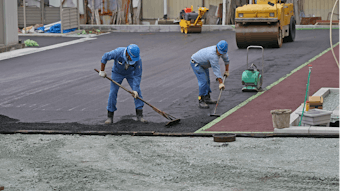


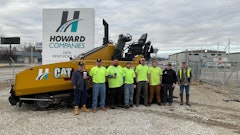
![Screen Shot 2023 01 04 At 5 23 30 Pm[35]](https://img.forconstructionpros.com/files/base/acbm/fcp/image/2023/01/Screen_Shot_2023_01_04_at_5.23.30_PM_35_.63bc42696de27.png?auto=format%2Ccompress&fit=crop&h=135&q=70&w=240)

![[VIDEO] NPE2016 Offers Over 50 Educational Programs](https://img.forconstructionpros.com/files/base/acbm/fcp/image/2015/12/default.565f0dab7d8a8.png?auto=format%2Ccompress&fit=crop&h=135&q=70&w=240)



